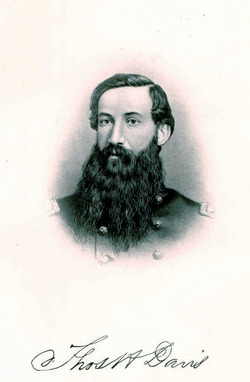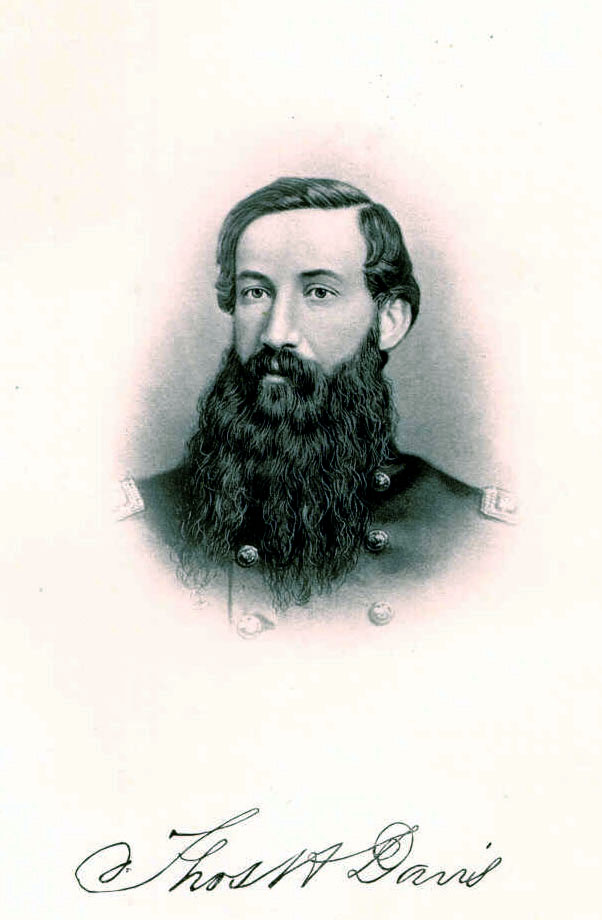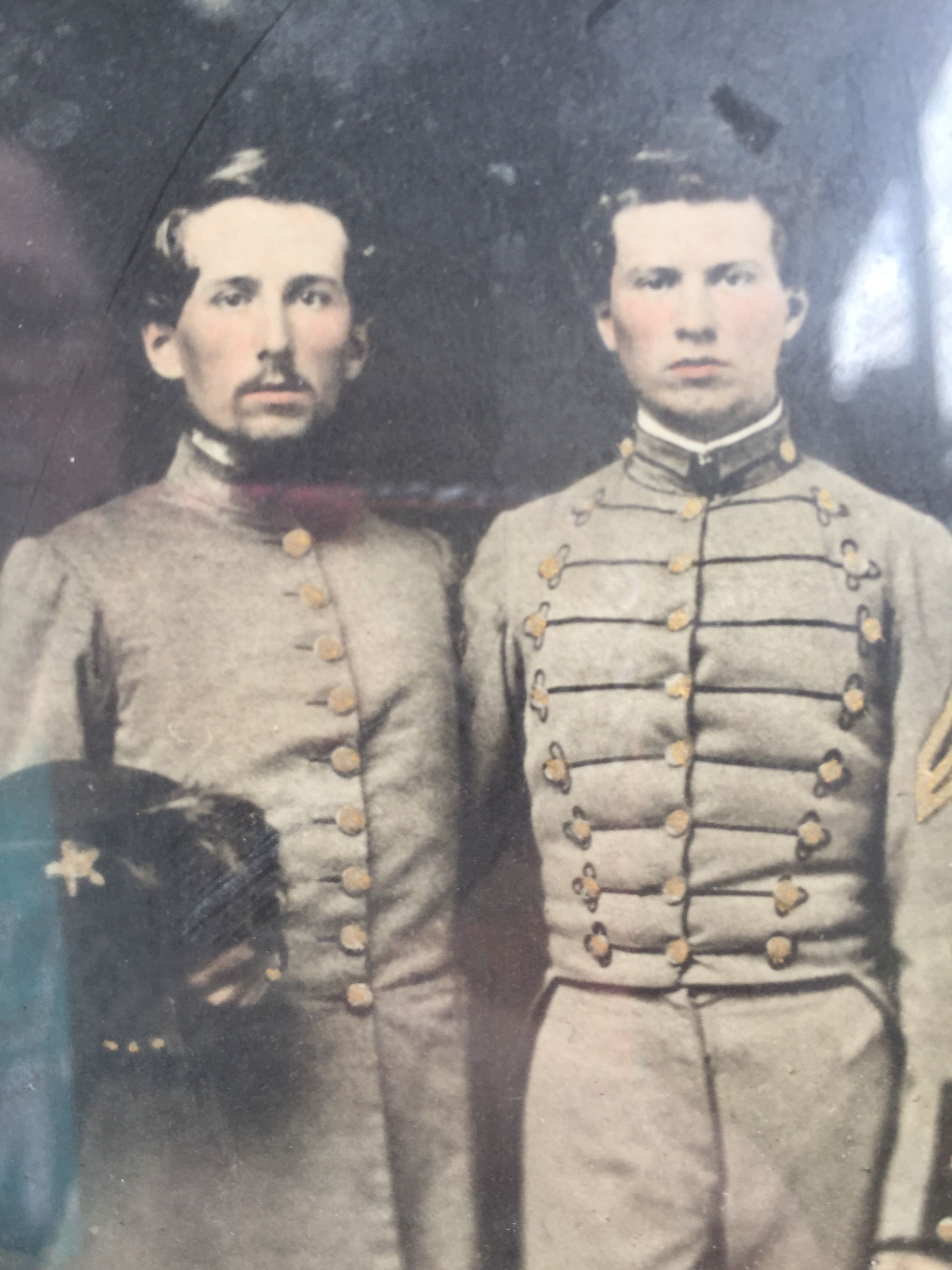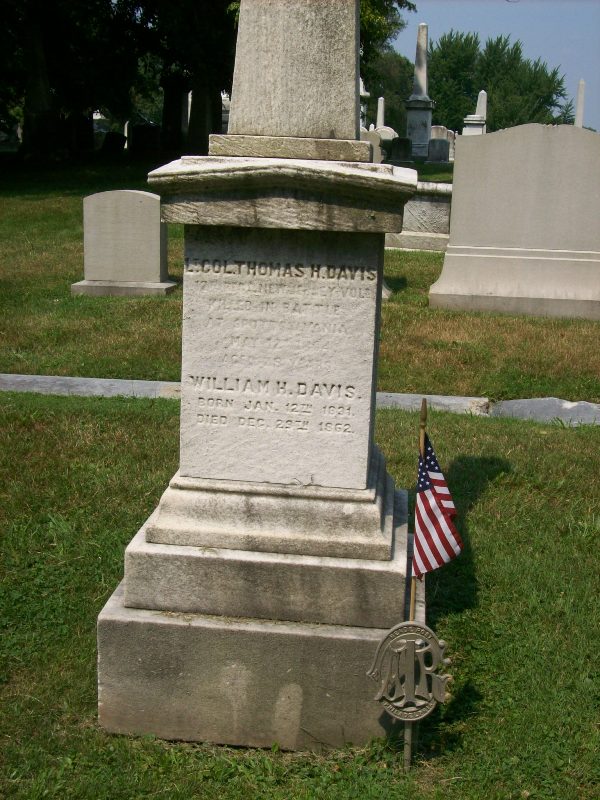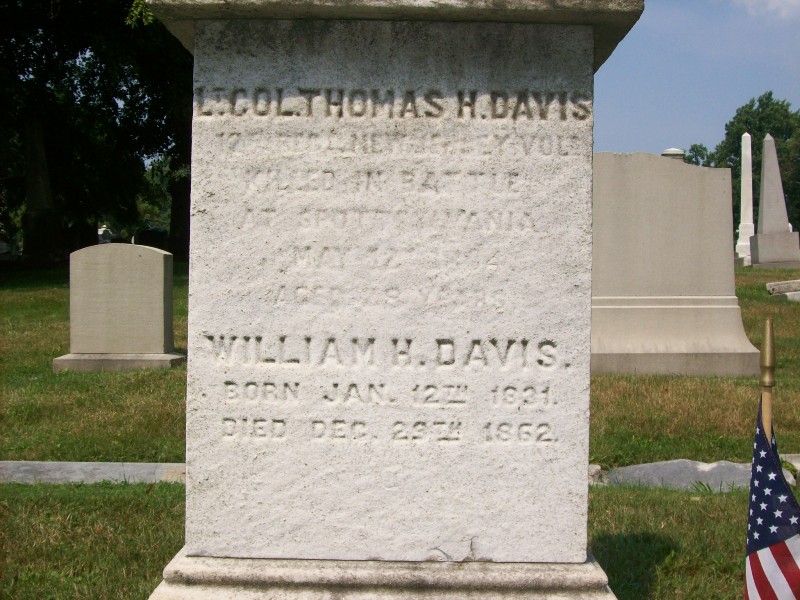Civil War Union Army Officer. Thomas Hatch Davis was born on July 23, 1835, in Camden, Camden County, New Jersey. He was the fourth child of Benjamin Town Davis (1795-1850) and Eleanor Gray Hatch (1801-1883). Davis enlisted in the Union Army on July 9, 1862, as a Major in the 12th New Jersey Volunteer Infantry. The regiment was organized at Camp Stockton in Woodbury, New Jersey, in the Summer of 1862 in response to President Abraham Lincoln's call for an additional 300,000 men for the Union Army. After training through the summer, it was officially mustered into the Union Army on September 4, 1862. On September 4, 1862, Major Davis was commissioned into the Field & Staff of the 12th New Jersey. The regiment's first assignment was guard duty in Ellicott Mills, Maryland. It first went on duty there on September 8th and remained there until December 10th. It then moved to Washington, D.C., where it joined the II Corps of the Army of the Potomac, then proceeded with the Corps to Falmouth, Virginia, reporting there on December 20th and remaining encamped there for the winter.
On February 27, 1863, Thomas Davis was promoted to the rank of Lieutenant-Colonel. His promotion came as a result of the 12th N.J.'s Colonel, Robert C. Johnson, being discharged for disability due to a fall from his horse. Thus, Lieutenant-Colonel John Howard Willets was promoted to Colonel, and Davis was promoted to take Willets's place as Lieutenant-Colonel of the regiment. The 12th N.J. remained in Falmouth, VA, until April 27, 1863, when it led the II Corp's crossing of the Rappahannock River just before the Battle of Chancellorsville.
Lt. Colonel Davis served with the regiment from its very beginnings in July of 1862 until the Spring of 1863, when he fell severely ill. Due to this unspecified illness, Davis missed the 12th New Jersey Volunteer Infantry's combat at the Battle of Chancellorsville and the Battle of Gettysburg.
At the Battle of Chancellorsville, Colonel Willets was wounded in his arm and face and eventually was discharged for disability. At the Battle of Gettysburg, with both Colonel Willets and Lieutenant-Colonel Davis absent due to their respective disabilities, the regiment was commanded by Major John T. Hill and other officers during their famous " buck and ball" capture of Bliss Farm. Shortly after the conclusion of the Battle of Gettysburg and the subsequent pursuit of the Confederate Army, Lieutenant-Colonel Thomas Hatch Davis returned to the 12th New Jersey and assumed command of the regiment. Upon Davis's return, the 12th N.J. was assigned to duty on the Orange and Alexandria Railroad. This lasted until September 12th, when the regiment was part of an advance from the Rapidan River to the Rappahannock River. After which, Lt. Col. Davis led the regiment in both the Bristoe Campaign and the Mine Run Campaign. Afterward, the regiment was encamped for the winter at Stevensburg, Virginia, until May 3, 1864.
After wintering, the 12th N.J. Infantry was a part of the newly promoted Lt. General Ulysses S. Grant's southern attack in the Battle of the Wilderness, which lasted from May 5-7, 1864. On May 6th, during the Battle of the Wilderness, Lieutenant-Colonel Davis was "disabled" by "several wounds" from shell fragments. However, he was only disabled momentarily, as he fought with the 12th New Jersey again on May 7th. Ultimately, the regiment took severe casualties during the Battle of the Wilderness, with one officer killed and several others, including Davis, wounded.
The 12th N.J. infantry then participated in the Battle of Spotsylvania Court House, which lasted from May 8–21, 1864, with Lt. Col. Davis leading it in combat throughout the first 5 days of the battle as a part of Maj. General Winfield Scott Hancock's II Corps. On May 10th, Davis and his regiment participated in the so-called "Battle of the Po [River]," which General Grant was criticized for. On May 12, Lieutenant-Colonel Davis led the 12th New Jersey Volunteer Infantry in Grant's infamous and vicious grand assault on what would become known as the "Bloody Angle." Heavy rain fell as Hancock lined up his divisions, realizing that he and his commanders had only a vague idea of how strong the Confederates were at the expected point of attack or even what the ground was like; no reconnaissance had been possible because a ridge had blocked the view of Hancock's staff officers. The Confederates had established a long line of earthworks, which included a substantial half-mile bulge in the Confederate line called the Muleshoe Salient. At 4:35 AM, Hancock started his men toward the Muleshoe. During the night, Confederate pickets heard a rumbling that sounded like troops moving, and Maj. Gen. Edward Johnson alerted his brigade commanders. The Union's surprise element was shot when the Rebels heard hundreds of Federals let out a loud cheer in the morning fog, thinking they were close to the Rebel works. Confederate General Robert E. Lee noted the Union force's movement but mistakenly believed Grant was preparing to withdraw and removed his artillery from the Muleshoe Salient. Thus, when Hancock's men advanced on the morning of May 12th, they broke through the Confederate line that was without artillery. Once they reached the earthworks, abatis fortifications blocked the way. The Union's front worked feverishly to clear them away. Within the works, Rebels got the order to fire, but the damp morning air and recent rain had ruined much of the Confederates' gunpowder, and the powder charges failed to ignite. Lt. Col. Davis, the 12th N.J., and the rest of the Union forces poured over the Confederate earthworks, firing point-blank into other men's faces, fighting hand-to-hand with swords, bayonets, and clubbed muskets; the 15,000 infantrymen of Hancock's II Corps had crowded into a narrow front about a half-mile wide and had become little more than a vicious armed mob. Hancock's attack, plunging into the heart of the Muleshoe, was close to splitting Lee's army in half.
Lt. Colonel Davis had led the men of the 12th New Jersey in a successful assault on the first line of Confederate defenses, but a second, stronger line of Confederate defenses meant to repel their attack loomed ahead of them. Additionally, after overrunning the first line, the Union forces had become hopelessly tangled and confused in the elaborate Rebel fortifications. In the assault on the second Confederate line, Lieutenant-Colonel Thomas H. Davis was killed as he led the 12th N.J. in a charge. One Union soldier noted, "Conspicuous through the mist and gunsmoke was Lieutenant Colonel Thomas H. Davis, of the 12th New Jersey, his long beard streaming and his sword flashing overhead until a rebel bullet cut him down [Davis was killed instantly]." He was only 28 years old.
After Lt. Col. Davis was killed in action, command of the 12th New Jersey Infantry was assumed by Captain McCoomb, who was subsequently killed during the Battle of Cold Harbor. Moving on with Grant's southern push, the regiment was a part of the Siege of Petersburg from June 16 to April 2, 1865. Soon afterward, it was present at the Battle of Appomattox Court House and Robert E. Lee's surrender to Grant.
Lieutenant-Colonel Davis was initially buried where he fell on the battlefield at Spotsylvania. His body was then reinterred in Fredericksburg, Virginia. However, in November of 1865, his family had him reinterred once more at Laurel Hill Cemetery (Section I, Lot 196) in Philadelphia, Pennsylvania, just across the Delaware River from his birthplace in Camden, New Jersey.
Civil War Union Army Officer. Thomas Hatch Davis was born on July 23, 1835, in Camden, Camden County, New Jersey. He was the fourth child of Benjamin Town Davis (1795-1850) and Eleanor Gray Hatch (1801-1883). Davis enlisted in the Union Army on July 9, 1862, as a Major in the 12th New Jersey Volunteer Infantry. The regiment was organized at Camp Stockton in Woodbury, New Jersey, in the Summer of 1862 in response to President Abraham Lincoln's call for an additional 300,000 men for the Union Army. After training through the summer, it was officially mustered into the Union Army on September 4, 1862. On September 4, 1862, Major Davis was commissioned into the Field & Staff of the 12th New Jersey. The regiment's first assignment was guard duty in Ellicott Mills, Maryland. It first went on duty there on September 8th and remained there until December 10th. It then moved to Washington, D.C., where it joined the II Corps of the Army of the Potomac, then proceeded with the Corps to Falmouth, Virginia, reporting there on December 20th and remaining encamped there for the winter.
On February 27, 1863, Thomas Davis was promoted to the rank of Lieutenant-Colonel. His promotion came as a result of the 12th N.J.'s Colonel, Robert C. Johnson, being discharged for disability due to a fall from his horse. Thus, Lieutenant-Colonel John Howard Willets was promoted to Colonel, and Davis was promoted to take Willets's place as Lieutenant-Colonel of the regiment. The 12th N.J. remained in Falmouth, VA, until April 27, 1863, when it led the II Corp's crossing of the Rappahannock River just before the Battle of Chancellorsville.
Lt. Colonel Davis served with the regiment from its very beginnings in July of 1862 until the Spring of 1863, when he fell severely ill. Due to this unspecified illness, Davis missed the 12th New Jersey Volunteer Infantry's combat at the Battle of Chancellorsville and the Battle of Gettysburg.
At the Battle of Chancellorsville, Colonel Willets was wounded in his arm and face and eventually was discharged for disability. At the Battle of Gettysburg, with both Colonel Willets and Lieutenant-Colonel Davis absent due to their respective disabilities, the regiment was commanded by Major John T. Hill and other officers during their famous " buck and ball" capture of Bliss Farm. Shortly after the conclusion of the Battle of Gettysburg and the subsequent pursuit of the Confederate Army, Lieutenant-Colonel Thomas Hatch Davis returned to the 12th New Jersey and assumed command of the regiment. Upon Davis's return, the 12th N.J. was assigned to duty on the Orange and Alexandria Railroad. This lasted until September 12th, when the regiment was part of an advance from the Rapidan River to the Rappahannock River. After which, Lt. Col. Davis led the regiment in both the Bristoe Campaign and the Mine Run Campaign. Afterward, the regiment was encamped for the winter at Stevensburg, Virginia, until May 3, 1864.
After wintering, the 12th N.J. Infantry was a part of the newly promoted Lt. General Ulysses S. Grant's southern attack in the Battle of the Wilderness, which lasted from May 5-7, 1864. On May 6th, during the Battle of the Wilderness, Lieutenant-Colonel Davis was "disabled" by "several wounds" from shell fragments. However, he was only disabled momentarily, as he fought with the 12th New Jersey again on May 7th. Ultimately, the regiment took severe casualties during the Battle of the Wilderness, with one officer killed and several others, including Davis, wounded.
The 12th N.J. infantry then participated in the Battle of Spotsylvania Court House, which lasted from May 8–21, 1864, with Lt. Col. Davis leading it in combat throughout the first 5 days of the battle as a part of Maj. General Winfield Scott Hancock's II Corps. On May 10th, Davis and his regiment participated in the so-called "Battle of the Po [River]," which General Grant was criticized for. On May 12, Lieutenant-Colonel Davis led the 12th New Jersey Volunteer Infantry in Grant's infamous and vicious grand assault on what would become known as the "Bloody Angle." Heavy rain fell as Hancock lined up his divisions, realizing that he and his commanders had only a vague idea of how strong the Confederates were at the expected point of attack or even what the ground was like; no reconnaissance had been possible because a ridge had blocked the view of Hancock's staff officers. The Confederates had established a long line of earthworks, which included a substantial half-mile bulge in the Confederate line called the Muleshoe Salient. At 4:35 AM, Hancock started his men toward the Muleshoe. During the night, Confederate pickets heard a rumbling that sounded like troops moving, and Maj. Gen. Edward Johnson alerted his brigade commanders. The Union's surprise element was shot when the Rebels heard hundreds of Federals let out a loud cheer in the morning fog, thinking they were close to the Rebel works. Confederate General Robert E. Lee noted the Union force's movement but mistakenly believed Grant was preparing to withdraw and removed his artillery from the Muleshoe Salient. Thus, when Hancock's men advanced on the morning of May 12th, they broke through the Confederate line that was without artillery. Once they reached the earthworks, abatis fortifications blocked the way. The Union's front worked feverishly to clear them away. Within the works, Rebels got the order to fire, but the damp morning air and recent rain had ruined much of the Confederates' gunpowder, and the powder charges failed to ignite. Lt. Col. Davis, the 12th N.J., and the rest of the Union forces poured over the Confederate earthworks, firing point-blank into other men's faces, fighting hand-to-hand with swords, bayonets, and clubbed muskets; the 15,000 infantrymen of Hancock's II Corps had crowded into a narrow front about a half-mile wide and had become little more than a vicious armed mob. Hancock's attack, plunging into the heart of the Muleshoe, was close to splitting Lee's army in half.
Lt. Colonel Davis had led the men of the 12th New Jersey in a successful assault on the first line of Confederate defenses, but a second, stronger line of Confederate defenses meant to repel their attack loomed ahead of them. Additionally, after overrunning the first line, the Union forces had become hopelessly tangled and confused in the elaborate Rebel fortifications. In the assault on the second Confederate line, Lieutenant-Colonel Thomas H. Davis was killed as he led the 12th N.J. in a charge. One Union soldier noted, "Conspicuous through the mist and gunsmoke was Lieutenant Colonel Thomas H. Davis, of the 12th New Jersey, his long beard streaming and his sword flashing overhead until a rebel bullet cut him down [Davis was killed instantly]." He was only 28 years old.
After Lt. Col. Davis was killed in action, command of the 12th New Jersey Infantry was assumed by Captain McCoomb, who was subsequently killed during the Battle of Cold Harbor. Moving on with Grant's southern push, the regiment was a part of the Siege of Petersburg from June 16 to April 2, 1865. Soon afterward, it was present at the Battle of Appomattox Court House and Robert E. Lee's surrender to Grant.
Lieutenant-Colonel Davis was initially buried where he fell on the battlefield at Spotsylvania. His body was then reinterred in Fredericksburg, Virginia. However, in November of 1865, his family had him reinterred once more at Laurel Hill Cemetery (Section I, Lot 196) in Philadelphia, Pennsylvania, just across the Delaware River from his birthplace in Camden, New Jersey.
Bio by: Robert Mayer III
Family Members
Advertisement
